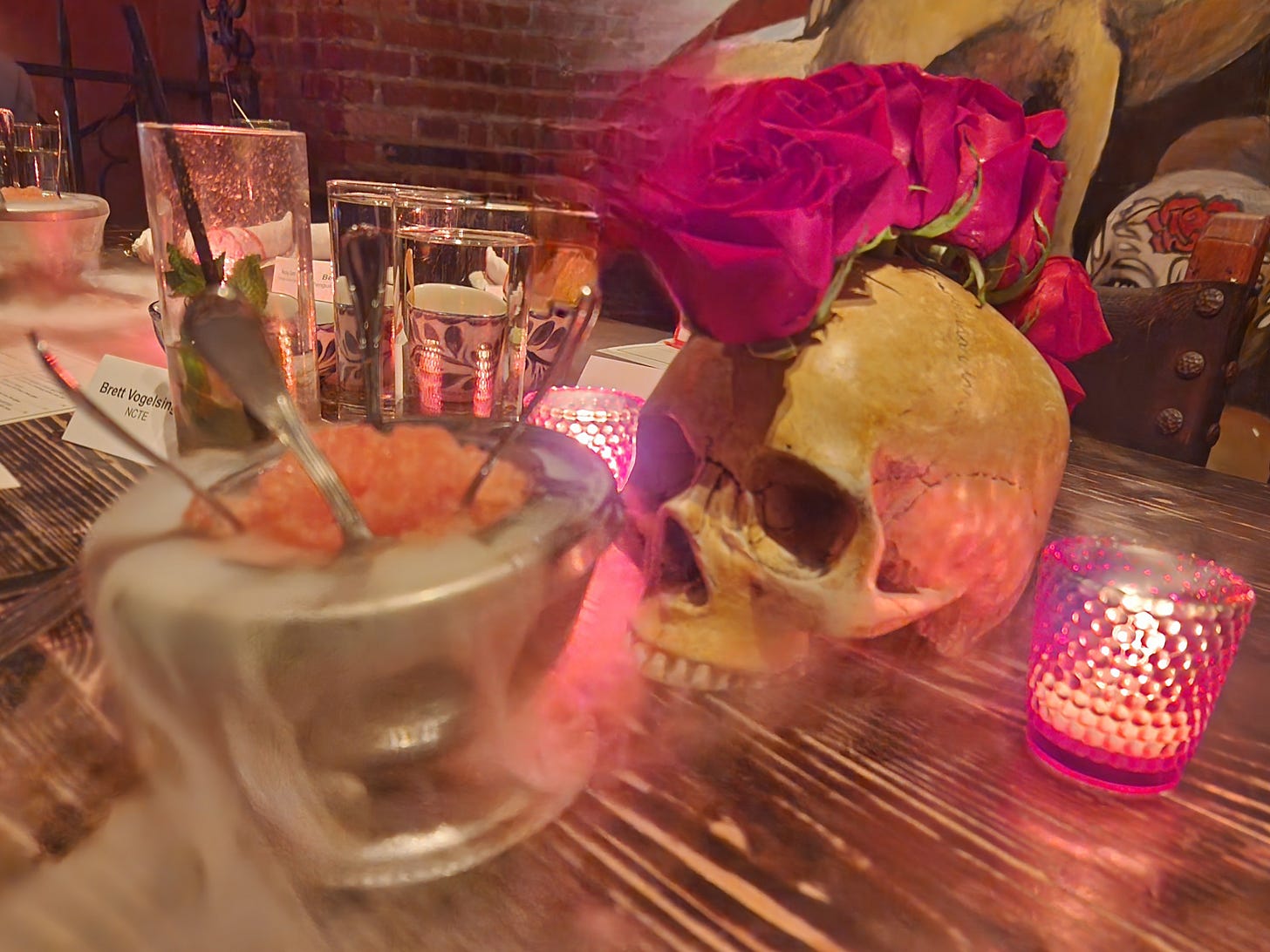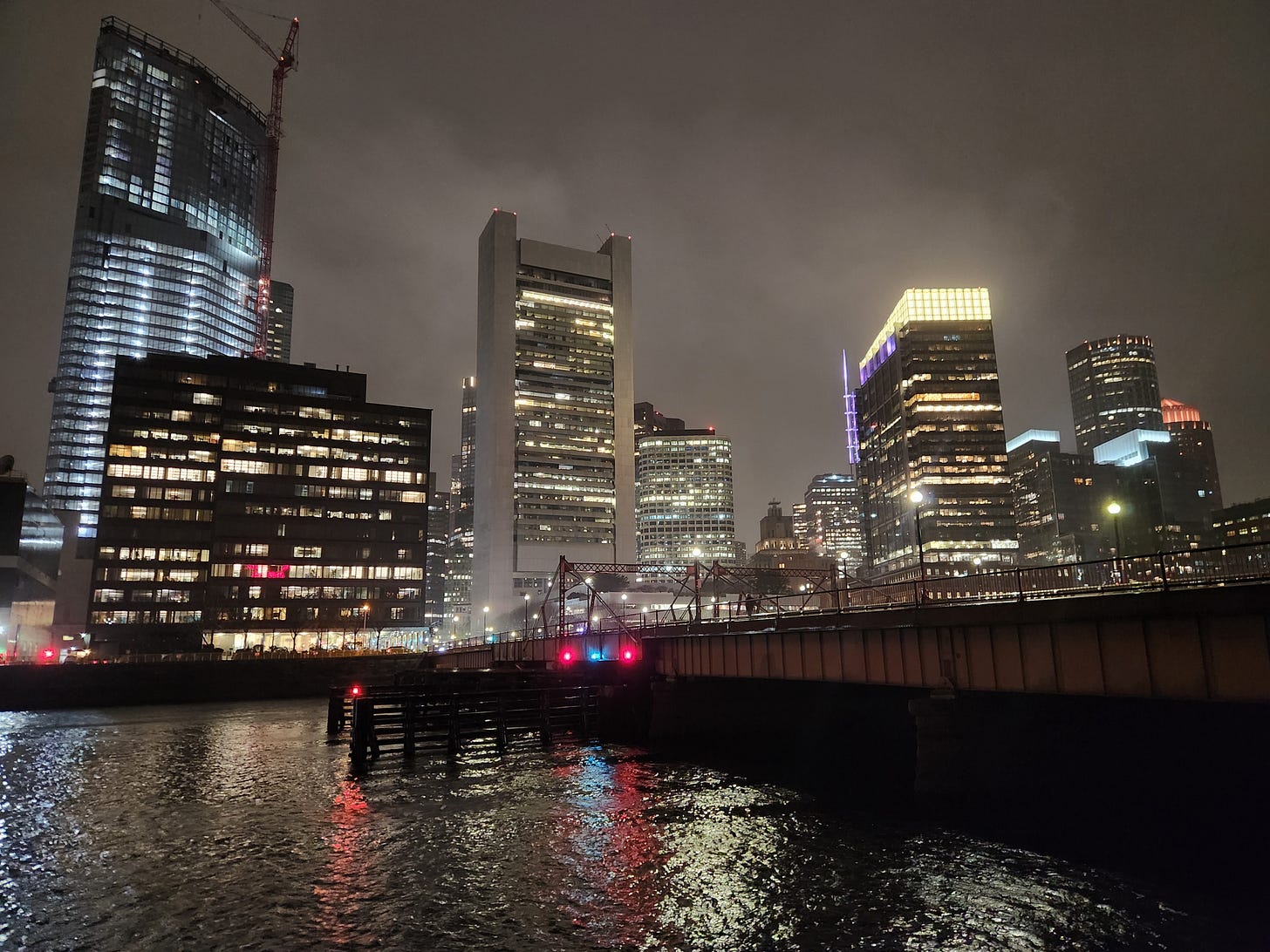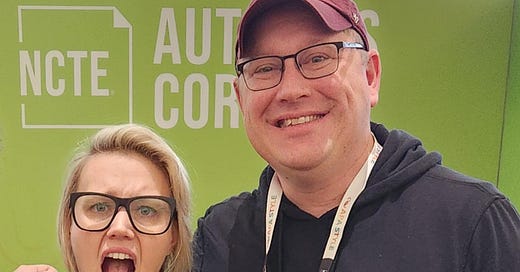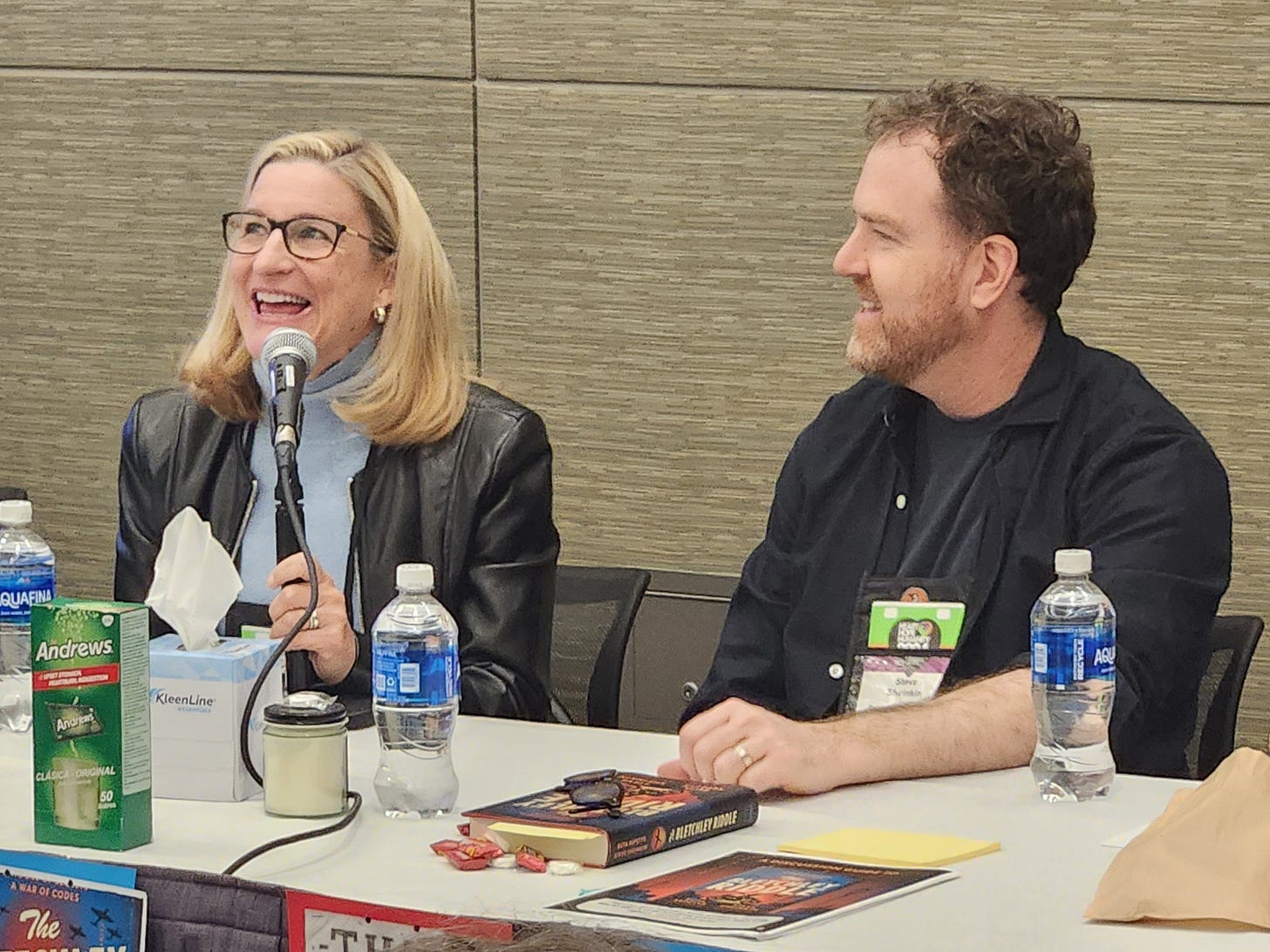A Triumphant Return to “The Nerd Conference”
The best thing about November is my annual trip to NCTE, a gathering of English teachers I affectionately call “The Nerd Conference.” It sounds really dorky, but as a Book Person™, it’s a necessary pilgrimage I take almost every year. For the past couple of cons, my wife (also a teacher and also a Book Person™) has gone with me, which has turned the event into a weekend-long date where we listen to our favorite authors speak, collect free ARCs, and enjoy a few good restaurants outside of the usual stuff we’ve had a million times in our hometown.
The keynote speakers are also very good at this conference. Last year we ended up about thirty feet away from Tom Hanks when he spoke. This year, we listened to Supreme Court Justice Kentaji Brown Jackson on our first night, and actress Kate McKinnon (who famously played Supreme Court Justice Ruth Bader Ginsberg on SNL) the next morning.
On top of everything else, it’s the only team each year that I get to hobnob with my friends at Penguin Random House Education. I’ve been on an advisory board there since 2020 and have made some great friends through that opportunity. PRH usually forks over the corporate credit card so my rep friends can treat us to a nice meal, and this year we ate at a fantastic Mexican restaurant right across the river from where rebellious colonists once held their famous Tea Party. That’s as far away as we got from the convention center, though, since we only had 48 hours to see and do everything we wanted to see and do.

In any event, when there are brilliant authors running around dropping knowledge all weekend, one is sure to end up with oodles of tidbits and nuggets to share with the good subscribers of the Brigham Editorial newsletter. That’s the theme for this month’s go-round, so let’s get to the goods, shall we?
An Interesting Take on Comps
While waiting in line to meet James Dashner, author of The Maze Runner series, I chatted with his literary agent, the wonderful Marisa Corvisiero. I asked whether there was anything she wished querying writers would better understand, and she told me that—for her at least—comp titles matter a ton, though not necessarily in the way you’re thinking.
If you’re new to the conversation about comp titles in a query letter, there are a few reasons why most agents like them:
They give agents a sense of what kind of book they’re being asked to sell, not just in terms of genre and age level, but themes, characters, and voice.
They show agents you understand the industry and have a strong sense of where your book belongs on shelves.
Corvisiero said that while many querying authors are pretty good at this, what she often finds herself wondering while reading comps isn’t just how the manuscript is similar to the books provided, but also unique.
In other words, you should strive to give agents a sense of books that are similar to yours, but you should also give agents a sense of what will make your book stand out. They don’t want to sell a book that’s already been sold; they want to sell a book that has the properties of a book that has previously sold, but they need a unique angle to pitch to publishers.
Don’t spend 100 words of your query doing this, but I think it’s a good idea to add a sentence that accomplishes this. Start by breaking down how similar your book is to Title A and Title B, but then also break down what will make this pop. Assure them that what you’ve written isn’t derivative. To me, this sounds like a great way to break through the slush.
The Many Flavors of Revision
The author panels at NCTE are some of my favorite aspects of these conferences, and this year, I found myself taking notes about some of the unique ways that authors revise. Specifically, I jotted down some interesting approaches from two-time Printz Award winner A.S. King and NYT bestselling MG author Ruta Sepetys.
King, who is brilliant, admits to being a pantser, but she doesn’t write a full sloppy copy before sitting down to make sense of what she’s got. King likes to “write fifty pages and then play archaeologist,” meaning that at the 50-page mark, she stops writing to root around in the dirt and mud of those opening pages to make sense of what she’s done and where she might be heading.
This doesn’t mean she knows how the rest of the book will play out. Instead, she’s looking for details that might drive the rest of that first draft forward. For example, she may have absentmindedly written that a character never drinks alcohol. When she first wrote it, it didn’t mean anything special, for no good reason at all, but at the fifty-page archaeological dig, she’s asking what that could mean and how it might inform the character and the plot moving forward.
As a plotter (and an editor who knows how much extra revision a pantsed draft can require), I can sometimes be a little snarky when discussing the pantsers in my life. This, though, is pantsing on steroids. It’s so artful and intentional without sacrificing the beauty and adrenaline of discovery.
Sepetys is a pantser, too, but in an entirely different way. As a former music executive, she talks about drafting and revising the way professional singer-songwriters might talk about the process of writing a song. In Nashville, where Sepetys currently lives, the songwriting process goes something like this:
Write something. It doesn’t matter how good it is.
Perform it at a small venue like The Bluebird Cafe, where other artists hang out and listen among a small (but live) audience.
Immediately after the performance, talk with your artist buddies about what parts of the song worked and which didn’t. Then, brainstorm and workshop ideas to improve it, right there on the spot.
Sometime later, perform it again and elicit more feedback. Fine-tune further. Rinse and repeat.
While authors don’t have The Bluebird Cafe at their disposal, they do have plenty of places to elicit feedback—from other writers they trust, online forums, or even smart and handsome freelance developmental editors. I love the idea of pantsing and then getting eyeballs early in the process. It requires vulnerability and openness to critical feedback. Throwing your work out there, talking through next steps, and then applying those next steps is a dev editor’s dream!
I see a lot of pantsed drafts where the Pantser is hoping to keep as much as possible, but that’s usually a tough ask. I would love if pantsers would head into their discovery draft knowing that 1.) anything can/could go, and 2.) sometimes you just have to get eyeballs on your work. It’s a healthy approach to drafting and revision.
Quick Hits
There was so much more that I found useful and encouraging at NCTE, but I can’t write 500 words apiece on all of them. Here’s a quick rundown of the best of the rest:
Kate McKinnon has written a middle-grade book, and it’s fantastic. If you want a crash course in voice and humor, read the first three pages and you’ll get the drift. It’s hard to be funny in the context of literature, but McKinnon (unsurprisingly) nails it.
McKinnon said the following in her keynote speech, which gave me chills: “Our purpose on Earth is to become the most authentic versions of ourselves.” May we all figure out who we are, what we value, and what we love in enough time to do something about it.
Kwame Alexander: “If you don’t consider yourself an artist, collect little pieces of yourself, and that’s your story.”
Ruta Sepetys: “You go searching for story, and story finds you.”
Steve Sheinkin: “Good editorial notes are annoying because you know they’re right.”
I really liked that last one!
Brigham Editorial Updates
On my way out this month, I want to leave you with a few notes on the business side of things:
All of my pricing for 2025 will stay the same with one exception: I’m raising my rates for Copy Edits from $20 per 1,000 words to $22 per 1,000 words. It’s just a time thing. Copy editing takes me longer than most developmental editing, so I’m trying to set a price that reflects that.
If you book a 2025 Copy Edit before January 1st, I will honor the current rate instead of the increased rate.
I have no idea what I’m going to do with social media. I’ve spent 15 years building a platform on Twitter, but it makes me physically ill to keep sending money to Elongated Muskrat. Bluesky has fun vibes and a lot of the features I wish Twitter still had, but the user base is still comparatively small and thus engagement has been low so far. For now, I’ll post at both places, but I haven’t been posting much on either platform in the past month (mostly due to Election Fatigue). I guess your best bet is to just follow me wherever you’re most comfortable, but honestly, the newsletter is my highest-quality content, and you’re already a subscriber!
If you’ve got people asking you for holiday gift ideas, it’s perfectly fine to tell them, “You know, what I really want are some editorial services for my novel!” I don’t have any gift cards, but I’m happy to print something up on Canva for you!
Lastly, I’d like to share with you all (since you were part of it) that I far exceeded every goal for my business this year. I hope you all know how much I appreciate you. For those of you who have purchased services from me in the past, you know that the first and last thing I say to every author is, “Thank you for trusting me with your words.” I know my feedback isn’t always what you want to hear, but I pour my whole heart and soul into the work I do with this little family of authors. From the bottom of my heart, thank you, and here’s to continued success (for all of us!) in 2025!

Thank you, as always, for reading.
Hugs and high fives!
-JB







Amazing newsletter! And I'm so happy to see your business thriving. Happy Holidays to you, Amy, and the kids!